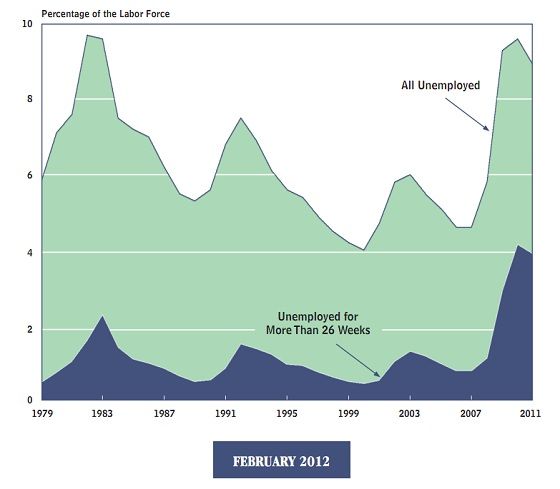So now we've gone from "success" to merely "short-term success." I suppose if "creating or saving" 1.3 million to 3.5 million jobs at a cost of between $228,000 and $586,000 per job is "success," then yes, the stimulus was a smashing short-term success. Does the Ezra Klein operative Dylan Matthews get into that? Does the leftist, Soros-funded Center on Budget and Policy Priorities talk about that, or discuss the CBO’s take on the
long-run impact of the stimulus:
Quote:
In contrast to its positive near-term macroeconomic effects, ARRA will reduce output slightly in the long run, CBO estimates—by between zero and 0.2 percent after 2016. But CBO expects that the legislation will have no long-term effects on employment because the U.S. economy will have a high rate of use of its labor resources in the long run. ARRA’s long-run impact on the economy will stem primarily from the resulting increase in government debt.
To the extent that people hold their wealth in government securities rather than in a form that can be used to finance private investment, the increased debt tends to reduce the stock of productive private capital. In the long run, each dollar of additional debt crowds out about a third of a dollar’s worth of private domestic capital, CBO estimates.
|
http://www.youtube.com/watch?v=2h_rDrd97sY
"a drag on the level of GDP..." because the stimulus was put, as the President likes to say about the war, "on a credit card."
Per the CBO report:
Quote:
|
The rate of unemployment in the United States has exceeded 8 percent since February 2009, making the past three years the longest stretch of high unemployment in this country since the Great Depression. Moreover, the Congressional Budget Office (CBO) projects that the unemployment rate will remain above 8 percent until 2014. The official unemployment rate excludes those individuals who would like to work but have not searched for a job in the past four weeks as well as those who are working part-time but would prefer full-time work; if those people were counted among the unemployed, the unemployment rate in January 2012 would have been about 15 percent. Compounding the problem of high unemployment, the share of unemployed people looking for work for more than six months—referred to as the long-term unemployed—topped 40 percent in December 2009 for the first time since 1948, when such data began to be collected; it has remained above that level ever since.
|

Back to Cannonshell's point,
"Last summer, Dylan Matthews reviewed the research on the stimulus for the Washington Post and dug up six studies that found a positive effect. Three of them were based on models that assume the stimulus worked. Three of them were supposedly empirical confirmations of this effect. These three all found that states (or counties) that got more stimulus money had stronger economic performances than places that received less.
But nobody denies that the federal government can shift the distribution of economic activity. If Congress were to give me $50 billion, I am sure car dealerships and liquor stores in my area would see an uptick in sales. That doesn’t mean the nation as a whole would come out ahead. (I am willing to go along with the experiment if Congress doubts this.)"
Obama’s Stimulus Helped Grow Debt, Not Economy
http://www.bloomberg.com/news/2012-0...h-ponnuru.html